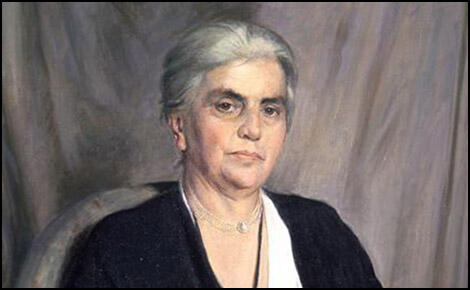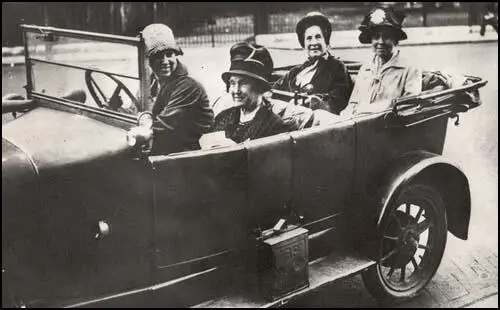National Union of Societies for Equal Citizenship
The National Union of Women's Suffrage Societies became the National Union of Societies for Equal Citizenship (NUSEC) in March 1919. Eleanor Rathbone succeeded Millicent Fawcett as president of the new body. Later that year Rathbone persuaded the organization to accept a six point reform programme. (i) Equal pay for equal work, involving an open field for women in industry and the professions. (ii) An equal standard of sex morals as between men and women, involving a reform of the existing divorce law which condoned adultery by the husband, as well as reform of the laws dealing with solicitation and prostitution. (iii) The introduction of legislation to provide pensions for civilian widows with dependent children. (iv) The equalization of the franchise and the return to Parliament of women candidates pledged to the equality programme. (v) The legal recognition of mothers as equal guardians with fathers of their children. (vi) The opening of the legal profession and the magistracy to women. (1)

Eva Hubback was appointed as parliamentary secretary National Union of Societies for Equal Citizenship. She closely monitored parliamentary business and fostered contacts with sympathetic MPs whom she briefed on key bills and parliamentary questions. "NUSEC maintained a series of specialist committees to concentrate on such issues as the civil service, equal franchise, the status of wives and mothers, married women's employment and women MPs." (2)
1923-1924 Labour Government
Ramsay McDonald appointed Margaret Bondfield as parliamentary secretary to the Minister of Labour, and the first woman to be given a post in government. (3) He also agreed the give all women the vote. On 29th February, 1924, Dorothy Jewson joined William Adamson in putting forward a motion to reduce the age that women could vote from 30 to 21, the same age as men. It was Jewson's first speech in the House of Commons. Estimates at the time suggested that this proposal would have meant half a million more women than men on the electoral register, and that 70% of wage earning women at the time were currently unable to vote. Jewson pointed out that the 1918 Qualification of Women Act was only a temporary measure. (4)
Jewson pointed out: "We believe that the 1918 Act was a compromise. It was only accepted, very reluctantly, by women's organisations in the country because it was agreed that to add 7,000,000 or 8,000,000 of new electors to the register was a very big experiment. I think no hon. Member will deny that that experiment of 1918 has been amply justified. We have had six years in which to consider whether or not that experiment was justified. In that time, we have had three elections, and I think every hon. Member will agree that in those elections women have shown very great interest, and an increasing interest, in national and international affairs. Uncertainty was expressed at the time as to how women would vote. I think everyone must now admit that they have exercised their vote wisely and well. Some fears were expressed that women might combine as a sex, and it was felt that that would be dangerous, because women who would be in larger numbers than men might so exercise the vote that we might have petticoat government. Events have shown that those fears were not founded on fact. The women have shown that they differ, like men differ, in their opinions; they have divided into parties in just the same way as men, and there is really no fear that women will combine as a sex and vote against the men. In an electorate of 26,000,000, it has been estimated that if women receive the vote on the same qualification as men there will be only about 500,000 more women on the register than men, and that half million would, of course, be spread over many constituencies." (5)
Katherine Stewart-Murray, a Tory MP supported the Labour motion. "I come next to the proposals in the Bill in regard to women. I quite agree that there are women voters who have grievances. There is the grievance of the woman university graduate who, though she may have taken a much better degree than many of the men of her year, finds she has to wait until the age of 30 before she can exercise the Parliamentary vote, while the young man who has taken an inferior degree gets the vote at the age of 21. There is also a grievance to which I do not think the Mover of the Second Reading referred. That is the grievance of the married women who are registered as voters in respect of their husbands, and who, if their husbands pre-decease them, are removed from the register until they make a fresh application to be enrolled in their own names. That is a grievance which would be recognised on all sides of the House. There is a further grievance of which I have seen something, and it is one of those to which the hon. Member has referred. It is the grievance of the single women over 30 in various professions, who find it difficult to get the vote because they are in lodgings and have not their own furniture. That is a grievance specially felt by many women assistant teachers in the country. These women often find it difficult to get lodgings, and if they took their own furniture with them they would have less chance than ever, and it would inconvenience them as they move on from one poet to another. They are entitled to have a vote." (6)
The Jewson motion was won 288 to 72, but the Ramsay McDonald was unable to bring in the legislation because Stanley Baldwin, the leader of the Conservative Party, and H. H. Asquith, the leader of the Liberal Party, decided to being the Labour government down over the issue of its relationship with the Soviet Union. On 30th September, the Liberals condemned the recently agreed trade deal with the Soviet Union. They claimed, unjustly, that Britain had given the Russians what they wanted without resolving the claims of British bondholders who had suffered in the revolution. "MacDonald reacted peevishly to this, accusing them of being unscrupulous and dishonest." (7) Leading figures in the NUSEC such as Margaret Bondfield, Susan Lawrence, Ellen Wilkinson and Selina Cooper continued to put their faith in the Labour Party (8)
1928 Equal Franchise Act
Stanley Baldwin, wanted to change the image of the Conservative Party to make it appear a less right-wing organisation. In March 1927 He suggested to his Cabinet that the government should propose legislation for the enfranchisement of nearly five million women between the ages of twenty-one and thirty. This measure meant that women would constitute almost 53% of the British electorate. The Daily Mail complained that these impressionable young females would be easily manipulated by the Labour Party. (9)
Winston Churchill, the Chancellor of the Exchequer, was totally opposed to the move and argued that the affairs of the country ought not be put into the hands of a female majority. In order to avoid giving the vote to all adults he proposed that the vote be taken away from all men between twenty-one and thirty. He lost the argument and in Cabinet and asked for a formal note of dissent to be entered in the minutes. There was little opposition in Parliament to the bill and it became law on 2nd July 1928. (10)

the passing of the 1928 Equal Franchise Act (2nd July, 1928)
As a result of the 1928 Equal Franchise Act all women over the age of 21 could now vote in elections. Many of the women who had fought for this right were now dead including Elizabeth Garrett Anderson, Barbara Bodichon, Dorothea Beale, Lydia Becker, Clementina Black, Jessie Boucherett, Mary Clarke, Emily Davies, Elsie Duval, Elizabeth Wolstenholme-Elmy, Isabella Ford, Rhoda Garrett, Cecilia Wolseley Haig, Elsie Inglis, Constance Lytton Mary Macarthur, Rachel McMillan and Emmeline Pankhurst. The act enfranchised an additional 5,221,902 women. (11)
Some veterans of the campaign such as Millicent Fawcett, the leader of the NUWSS, was still alive and had the pleasure of attending Parliament to see the vote take place. That night she wrote in her diary: "It is almost exactly 61 years ago since I heard John Stuart Mill introduce his suffrage amendment to the Reform Bill on May 20th, 1867. So I have had extraordinary good luck in having seen the struggle from the beginning." (12)
After the passing of the 1928 Equal Franchise Act the National Union of Societies for Equal Citizenship was disbanded.
Primary Sources
(1) Eva Hubback, The Yorkshire Post (13th February 1928)
It is interesting to note how much opinion in certain quarters with regard to Equal Franchise has changed since3 the Prime Minister's intentions were stated last April. This seems largely due, firstly, to the broadcasting of the figures relating to the age distribution of the women to be enfranchised, by which it was shown that two million of the five million will be women over 30, and that only slightly over 400,000 will be of the much criticised age of 21; and also to its having been pointed out that the women to be enfranchised include among their number the great majority of industrially and professionally occupied women…
It is possible that such a Bill might include a clause raising the legal minimum age of marriage to 16 years for both sexes. When the National Union of Societies for Equal Citizenship recently took a deputation on this subject to the Home Secretary, pointing out that the existence of a legal minimum marriage age of 12 for girls and 14 for boys placed this country among the most backward in the world as regards this point.
(2) Eva Hubback, The Common Cause (7th February 1930)
I suggest that in order to ensure that the status of a wife should be equal as regards the Income Tax to that of her husband we should continue to demand that the law should be altered to allow for the automatic separate assessment and separate taxation of the incomes of married people, each accepting the liability for his or her share, and dividing equally between them all rebates whether on children or personal allowances. Were this the law, husbands and wives would be on an exactly equal status and the unpaid work of her mother for her children in the home would receive recognition.
The following figures show how rates of taxation would vary according to the proportion of income held by a family of husband and wife and three children where their joint income is £1,000 a year and where it is assumed (for simplicity's sake) that the wife's income is unearned.
If husband pays on whole income the tax paid would be £118.
If husband pays on £900 and his wife pays on £100, tax pad would be £98.
If husband pays on £800 and his wife pays on £200, tax pad would be £85.
If husband pays on £700 and his wife pays on £300, tax pad would be £75.
If husband pays on £500 and his wife pays on £500, tax pad would be £71.

